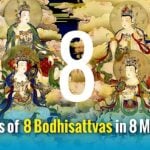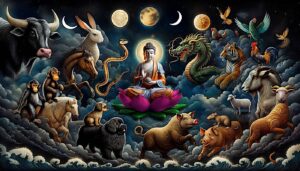Meditation retreat today is vital and precious and helps us have direct experience of “One Mind, One Body”: teacher Theodore Tsaousidis
How many of us actually find time for even a weekend retreat in today’s hectic world? Many Buddhists — and non-Buddhists — aspire to the quiet energy of retreat, not just to de-stress, but to actually still the mind sufficiently to progress mindfully. As meditation teacher Theodore Tsaousidis puts it: “silence is so extraordinary.” [Full talk transcript below.]
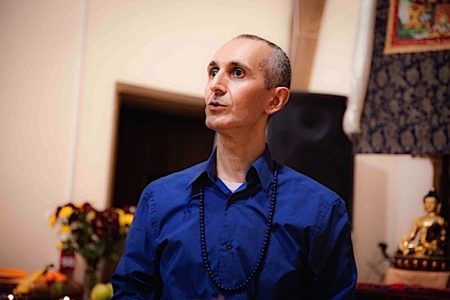
Yes, our daily practices and meditation are vital, but most Buddhist teachers from all traditions and schools, advise retreats at least once in a lifetime, and preferrably each year for serious students. After, all, human life is a precious, rare opportunity, and no matter how good our genes, we are all knocking on death’s door sometime in the near future. Time passes quickly, and opportunities are fleeting. Some of us are forced to engage in what is lightly called “working retreats” — where we continue our day job, but dedicate all non-work hours, for a certain period of weeks, to a few hours of meditative retreat. It may not have the same impact as a dedicated group retreat, but it’s a partial solution.
Still, as Theodore points out, ” it is extraordinarily rare to meditate together with other people.”
Of course, ultimately, the solitary closed retreat — iconically, the meditator alone in a cave on the mountain — is the highest aspiration in retreat. Finding time, let alone a mountain cave, is, needless-to-say, difficult. Finding time for group retreat is challenging enough for most of us.
At the opening of one of Theodore Tsaousidis’s retreat events, the “Touching Earth Retreat”, he spoke on “Why do we go to a meditation retreat?” With permission, we publish the transcription of his fascinating and insightful talk.
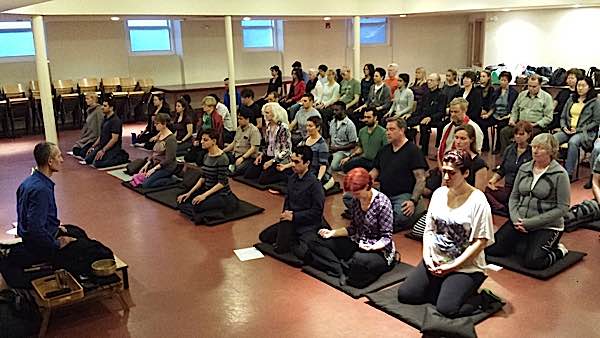
Why Do We Go To a Meditation Retreat?
Transcribed from a talk at the TOUCHING EARTH RETREAT 2016, FRIDAY MAY 20.
On the first night of a multi-day retreat, there is generally an opening talk to remind us of the reasons why we are here and what we came to do –thus setting the tone for the retreat. So tonight I would like to address a few points that I hope will provide encouragement to all of you as you begin and as you move through the following days.
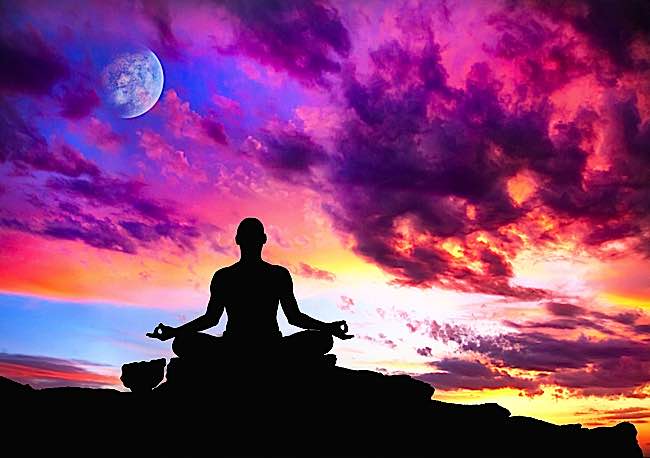
The first point I would like to address is our actual presence at this retreat or any other meditation retreat for that matter. Whether it is a work retreat, whether it is a healing or a metta/lovingkindness retreat, or another, doesn’t matter. And whether it is a Buddhist or secular retreat doesn’t matter. We need to ask ourselves not only why we’re here, but how is it out of millions of people in Ontario, we have chosen to be here today. There are many meditation centers and temples in this province, but how many people actually take the opportunity to recognize the benefit and understand the privilege of actually being in places like this that exist only for your benefit and well-being? Why are you here and why are others not? You came in spite of all the logistical demands of work, family, health and life in general. You came in spite of knowing the challenges intrinsic to the meditation experience. Challenges which are basically all the struggles you have in life brought up close and personal by the work you have chosen to do here. You knew that retreats are as exacting as they are beneficial and you still made the choice to come
Secondly, to be able to participate in a meditation retreat is a rare thing. REALLY, it is extraordinarily rare to meditate together with other people, to sit together in silence. The silence is also extraordinary. Here we are sitting in silence without looking at each other but every single one of us feels more connected to each other. Isn’t that interesting? Our eyes are facing down or closed. We’re not speaking, but there is a sense of connection. How beautiful, how extraordinary.
My teacher keeps saying that the purpose of retreat is for us to have a direct experience of this thing called “One Mind, One Body”. The reason we have structure and guidelines in retreat is to help us realize this “One Mind, One Body”. And this oneness is always here — but we are so noisy – always speaking, always looking for something to be distracted by, either visually or through any of our other senses. So much so that we cannot see this extraordinary one body/mind from which we have never been separate. So being in silence forces us to notice that.
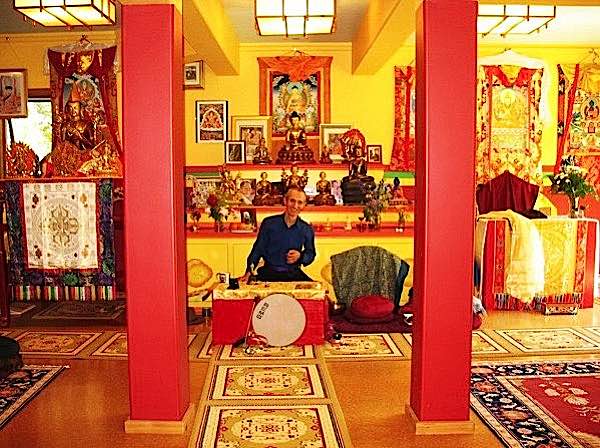
Words cannot begin to describe when we start to feel this connection with all things; not just with other human beings, but with all beings and things in the world — bugs, trees, grasses, flowers, the sun, the moon, the air, the cushion you’re sitting on, the chair. In this experience of non-separateness, you may try to write a poem about it or try to describe it, but you simply can’t. There is nothing you can say that comes close to it but this experience is enough to transform your life.
And because of the experience of this One Mind/Body, when we sit, we sit together as one. When we stand, we stand together as one, we walk together as one, we eat together as one, and we work together as one. When you have even a glimpse of this oneness, it shatters all illusions of separation, all illusions of aloneness. It begins to wear away at that feeling of loneliness, of that confusion about what’s going on — Who am I? What is this? Even that begins to be worn away.
So is a meditation retreat special? Is it something different from other things? Absolutely yes! It’s probably the most important resource to recognizing and discovering oneself. I know this to be so in my own life. To recognize or rediscover yourself – your true self, you actually have to drop that little self that is immersed in self-cherishing and constantly complaining. By realizing that all of us here are really One Self, we begin to experience this One Body/One Mind that my teacher talks about. So I don’t think it can be overstated that the rarest and most important thing in the universe is to sit in meditation with others, to work together — and be able to do this in spite of all our personal challenges.
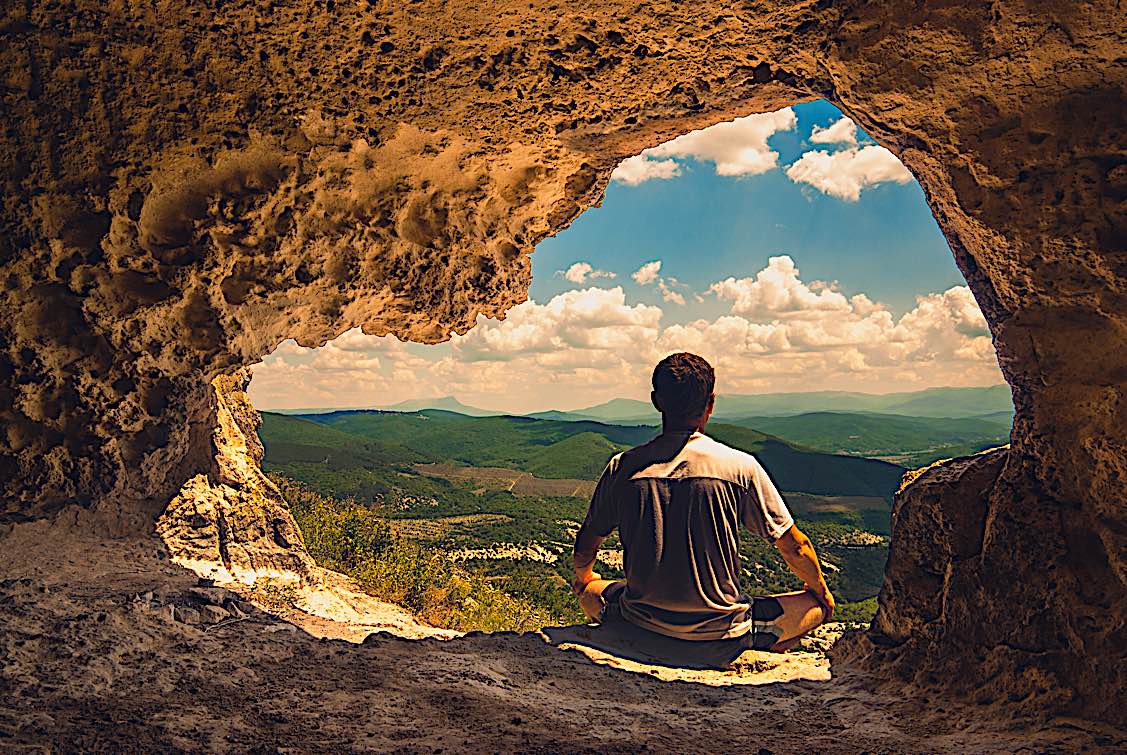
Thirdly, meditation retreats are not as many believe to achieve a state of bliss. Although a bliss state may occur, the recommendation is to move past it just as you do with the thinking mind. Retreats are in actual fact simple, but not easy, and unfinished business from the past may rear its head, as do our present struggles. As mentioned previously, we all came to this retreat in spite of all our personal challenges, the demands of work, family, health and our general day to day struggles. We all have different narratives from which we come – family culture, society, traumas, life experiences, and so on — and we all have different baggage which we bring. Meditation retreats also provide guidance and support through one to one teacher interviews, formal teachings and the very structure of the retreat itself.
The power and the strength that is generated in retreat by all of us creates an environment of healing, acceptance, safety and transformation. We have an opportunity to face whatever shows up and all we have to do is to keep breathing and putting one foot in front of the other, not thinking or worrying about the next step or the next breath. With this group energy and with one to one guidance of the teacher, we begin to see into the truth (or not truth) of our thoughts, feelings, emotions and beliefs. This exploration happens on a deep level. There is nothing you need to do except just be with your practice and not resist anything that comes up.
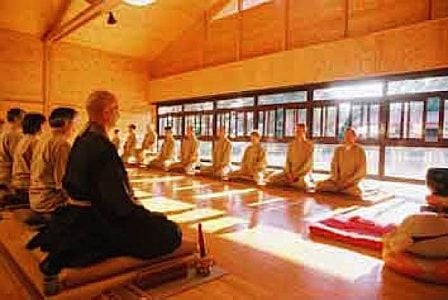
Just like the weather the situations of life change. Sometimes it is sunny, sometimes stormy and sometimes we can be hit by tornados, hurricanes or even a tsunami. However, what a retreat teaches us is that just because the weather of our lives keeps changing we don’t have to be more than what we are. That means that we don’t have to be something different in order to weather the storm.
A loose metaphor here can be a pine tree in a storm, or a pine tree in freezing snow, or if a tornado approaches, or if there are floods or a drought, the pine tree doesn’t say, “I wish I was an oak tree, or I wish I was a great rock, or I wish I was a fast running gazelle.” The tree is able to be a pine tree in the midst of whatever the weather is. It doesn’t look to become something else in order to escape the weather.
As Thich Nhat Hanh says, “A flower does not have to do anything to be of service. It only has to be a flower. That is enough. A human being, a true human being is enough to make the whole world rejoice.”
Thus what retreats do for us is help us recognize our capacity to unfold our own innate wisdom and compassion—the power of experiencing our worthiness and knowing that we are enough, to see that we are not separate. In retreats, we are forced to demonstrate that no matter what the weather, we do not have to be something else in order to weather the storm of the human condition—of birth, illness, old age and death. We are enough and who we are IS ENOUGH. There is not some kind of mistake making us face the storm and there is not some kind of flaw in us that created the storm.
So we will come through this retreat together not only for our own benefit and everyone who is here but for the whole world. We actually sit for all sentient beings and as my first master used to say, “Don’t take for granted the work of meditation. Even one consciousness breath that you take may be what is keeping the whole universe together.”
Adapted from the opening talk given in the Spring 2016 Retreat by Theodore Tsaousidis.
COPYRIGHT 2016. Used with Permission. Originally published on Endless Ground>>
More articles by this author
Search
Latest Features
Please support the "Spread the Dharma" mission as one of our heroic Dharma Supporting Members, or with a one-time donation.
Please Help Support the “Spread the Dharma” Mission!

Be a part of the noble mission as a supporting member or a patron, or a volunteer contributor of content.
The power of Dharma to help sentient beings, in part, lies in ensuring access to Buddha’s precious Dharma — the mission of Buddha Weekly. We can’t do it without you!
A non-profit association since 2007, Buddha Weekly published many feature articles, videos, and, podcasts. Please consider supporting the mission to preserve and “Spread the Dharma." Your support as either a patron or a supporting member helps defray the high costs of producing quality Dharma content. Thank you! Learn more here, or become one of our super karma heroes on Patreon.
Theodore Tsaousidis
Author | Buddha Weekly
As our human condition has it, everyone must participate to a lesser or larger degree in the “hero’s journey”. Understanding this, Theodore Tsaousidis lectures and facilitates workshops/retreats in mindfulness and in healing traditional practices. His work is offering everyday tools to help with life’s inevitable valleys. These valleys will invariably include the struggles of emotional and physical pain, the darkness of despair and the longing for healing.
Theodore assists in exploring the questions, “How do I deal with everything that is going on in my life and in the world and still finds peace and fulfillment?” “If I cannot find peace, if I cannot be centered in the whole human condition, where and when am I going to find it? If not now, then when?”
The workshops are based on the new Mind/Body science, medical research, the work of Jon-Kabat Zinn and on Theodore’s over forty years of meditation practice. The Healing Retreats conducted are founded on the Tibetan Buddhist Practices of purification and empowerment.
Born in rural Greece, surrounded by mountains and valleys, Theodore was profoundly shaped by nature, elder mentors, and the tradition of village healers. He has been a student of Buddhism for the past three decades and continues to study under traditional teachers in Zen and in Tibetan healing teachings. He is also guided by his own experiences and healing.
Theodore offers meditation and healing workshops and retreats in the Owen Sound and Toronto areas. (Those who have participated in the workshops or retreats, may continue with a group or individual support as needed to discuss one’s process.
Theodore teaches at—
MEDICINE BUDDHA TORONTO
Facebook: www.facebook.com/medicinebuddhatoronto
Website: https://medicinebuddhatoronto.org
TORONTO MINDFULNESS COMMUNITY
Website: https://torontomindfulnesscommunity.org
ENDLESS GROUND
https://endlessground.org





